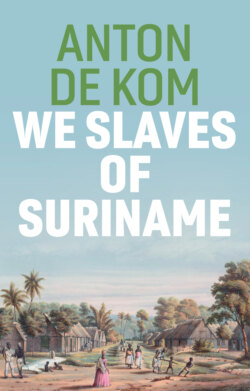Читать книгу We Slaves of Suriname - Anton de Kom - Страница 9
The Breath of Freedom We Slaves of Suriname as Literature Duco van Oostrum
ОглавлениеMy work as a professor of American literature in England focuses on African-American writing. I am sometimes asked to say something about Dutch literature, and this led me to wonder: are there any well-known Black Dutch writers from the 1920s or 1930s? In the United States, that was the time of the Harlem Renaissance, the dawn of African-American literature, known for authors such as W.E.B. Du Bois, Langston Hughes, Nella Larsen, and Zora Neale Hurston. When I asked Dutch literary scholars if these writers had any counterparts in our country, the answer was, “Not that we know of.”
An hour later, I was practically glued to my computer screen because, thanks to Google, I had found something. On the DBNL website, a digital database of Dutch-language literature, I had discovered We Slaves of Suriname, and I devoured it. Why hadn’t I known about this book? De Kom combined the themes and style of Du Bois, the outrage of Frederick Douglass, the probing analyses of Langston Hughes, and Harriet Jacobs’s struggle to share her story with the world. And all this in my own Dutch language, in a book about Suriname and about my country’s own suppressed history of slavery.
My astonishment grew as I explored the analyses of We Slaves. I work in the academic context of literary theory with an emphasis on postcolonial and African-American theory, as formulated in classic studies by Henry Louis Gates (The Signifying Monkey, 1984), Paul Gilroy (The Black Atlantic, 1993), and Toni Morrison (Playing in the Dark, 1996). But We Slaves has consistently been brushed aside as a strange hodgepodge of history, sociology, and a pinch of autobiography, and faulted for De Kom’s heavy reliance on earlier authors. We Slaves of Suriname, genuine literature? No, the scholars concluded, the term just didn’t fit.
It reminds me of the words of Du Bois: “Between me and the other world there is ever an unasked question: unasked by some through feelings of delicacy; by others through the difficulty of rightly framing it. All, nevertheless, flutter round it … How does it feel to be a problem?” (Souls of Black Folk, p. 9).
Yet by placing We Slaves in the context of African-American literature and theory, I intend to show that it is, in fact, a major work of Dutch literature. The “problem” of We Slaves as literature lies not in the book, nor in Anton de Kom, but in the prevailing perspectives on and framing of Dutch literature itself: what form it takes, who can write it, and how to read it.
